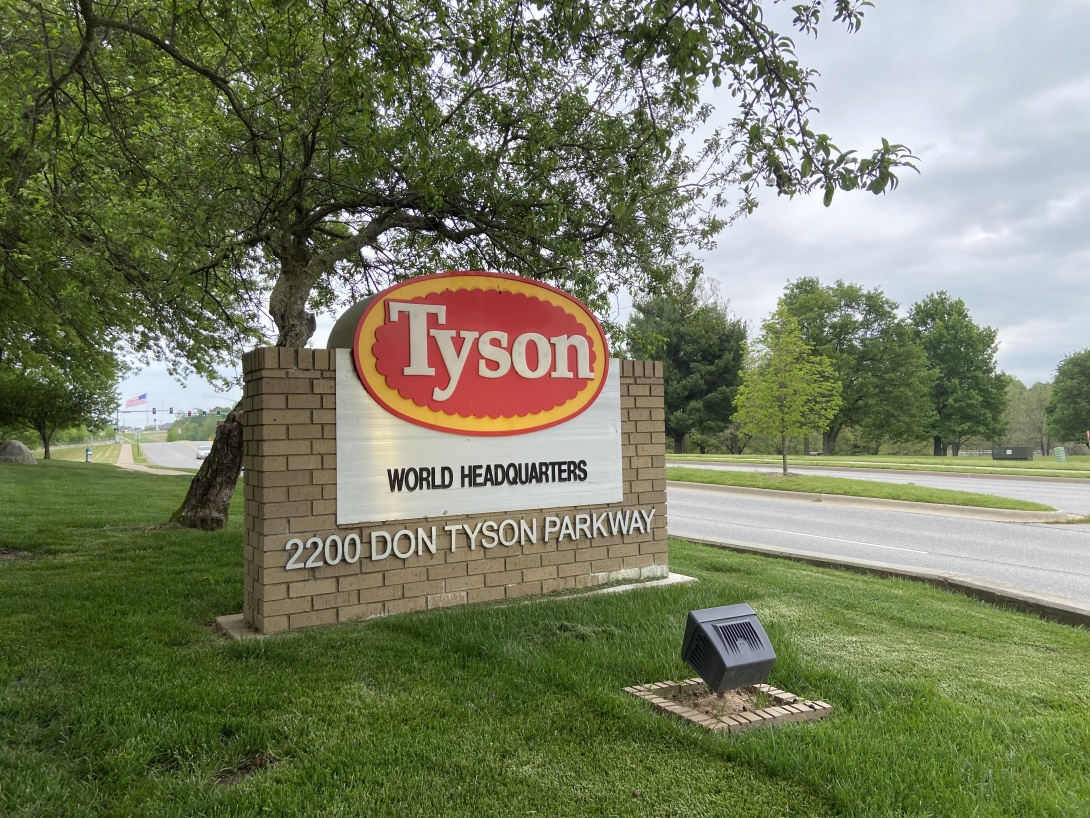Workers say Arkansas' poultry giants aren't protecting them from COVID-19

Tyson's world headquarters are located in Springdale, Arkansas, just miles away from a poultry processing plant where workers say the company isn't providing them adequate protection from COVID-19. (Photo by Olivia Paschal, Facing South.)
This story has been updated to include information about an executive order signed after publication.
On a rainy afternoon last week, organizers and allies of Venceremos, a poultry workers' organization based in northwest Arkansas, attempted to deliver a workers' petition to a Tyson chicken processing plant in Springdale, Arkansas, just 4 miles from the meatpacking giant's corporate headquarters.
The petition was signed by more than 170 Tyson workers in two northwest Arkansas factories, organizer and Venceremos co-founder Magaly Licolli told Facing South. It included several demands: transparency about COVID-19 cases in Tyson plants, stringent social distancing regulations, and full benefits including paid sick leave and wage increases for Tyson workers who must come into a workplace that puts dozens of workers nearly shoulder-to-shoulder with each other on the processing line because their work has been deemed essential. Tyson is the world's second-largest poultry producer, and the largest in the United States.
There is a health crisis unfolding in the nation's meatpacking plants, many of which have become hotspots for COVID-19 outbreaks. As of this writing, the Food and Environment Reporting Network has identified 85 meatpacking and food processing plants across the country with confirmed cases of the virus. So far, 21 plants have closed, more than 4,300 workers are sick, and at least 19 have died. Tyson's plants are not immune to the pandemic: In an East Texas Tyson factory, workers weren't told that a colleague had tested positive for the virus for two full weeks. Three workers at a Tyson plant in Georgia died of the virus — one of them after her superiors told her to come back to work while sick. And Kentucky state health officials recently reported 76 positive cases in two Tyson plants in the state.
Workers' concerns have become all the more pressing now that state and local officials have been prohibited from shutting down meatpacking plants by the federal government. An executive order signed by President Donald Trump on April 28 declares meatpacking plants critical infrastructure under the Defense Protection Act. Guidance on the order released by two federal agencies — the Occupational Safety and Health Administration (OSHA) and the Department of Labor — indicated that OSHA would not cite employers who failed to follow safety guidance if the companies had acted in “good faith,” and that the Labor Department would consider defending employers being sued by workers who had been exposed to COVID-19 in their plants.
The executive order came a day after Tyson's CEO published a full-page ad in three major newspapers warning that the food supply chain could "break" if plants were forced to close, and on the same day Trump said he had been working with Tyson executives towards provisions to shield Tyson and other companies from liability should their workers become sick with the virus.
Despite the concerns about workers' safety in Arkansas, Venceremos was turned away at Tyson's gate. Their Facebook livestream shows security stopping them outside the plant on Berry Street and telling Licolli and the rest of the group that they would ask a plant manager to come out to meet them. About 20 minutes later, a police officer arrives at the scene. He was dispatched at the behest of the office of Springdale Mayor Doug Sprouse, which told Facing South it received a call about an unpermitted protest from a resident. A Tyson spokesperson declined to say whether the plant's management had placed the call, referring questions to the Springdale police department, which said they had been called by the mayor's office.
Tyson's security team and unidentified employees who emerged from the building refused to accept the paper petition and deliver it to a plant manager, even with the police officer acting as a middleman. "We're open to dialogue, and we're open to conversation," Derek Burleson, a Tyson spokesperson, told Facing South. He said workers with concerns should bring them to their manager, to employee committees within each plant, or call the company's confidential helpline. But Facing South spoke with a worker at the Berry Street plant who has been with the company for nearly 20 years; she said that she is not aware of a helpline and didn't feel that managers would take her concerns seriously.
Workers in Tyson's own backyard, just a few miles away from executives' offices, are concerned about their safety. In Springdale, where the company is headquartered, Spanish-speaking immigrants make up much of Tyson's factory workforce. The company scans workers' temperatures as they enter the building, and sends people with a fever home. It has also installed "workstation dividers," but workers are still nearly shoulder-to-shoulder, much closer than public health guidelines recommend. The worker at Berry Street, who spoke to Facing South on condition of anonymity out of fear of retaliation, said that while the company has provided face masks, she worries that they're not being stringent on social distancing or telling all workers everything they know about potential positive tests.
"I would like them to let us know what's going on so we know the risks we are taking when we show up to work," the employee told Facing South in Spanish. "Our lives are at risk, our families, our kids."
Paychecks vs. lives
Venceremos' press release about the petition says that some workers at the Berry Street plant have been informed of one COVID-19 case there. However, Tyson refused to tell Facing South whether any workers had tested positive, and said the company isn't publicly sharing locations or numbers of any positive cases. "This situation changes all the time," Burleson, the Tyson spokesperson, said. "It's difficult to hone in on a specific number." He told Facing South that when workers test positive, the people they have been in contact with are informed — which doesn't necessarily mean all workers in any given factory are told of a positive case. But the worker Facing South spoke to said she doesn't think that the company is being transparent about communicating positive cases.
Licolli says that, for many of the Tyson workers who signed the petition, the company's current short-term disability and paid sick leave policies aren't enough to keep their families afloat, or to protect them from the virus. Currently, if a worker has a fever when they show up to work, they are sent home for the day. But they aren't eligible for paid sick leave unless they test positive for the flu or COVID-19. In the interim, Tyson's spokesperson said, workers are encouraged to apply for short-term disability, which the company has tried to make more accessible. But short-term disability doesn't provide full pay for workers who have to stay home — just a percentage of what their normal take-home pay would be.
For the worker Facing South spoke with, who makes around $13 an hour after nearly two decades with Tyson, short-term disability would not be enough to feed her family. Licolli, the Venceremos organizer, told Facing South that with restaurants and other businesses in Arkansas shuttered, many poultry workers have become the single source of income for their households. Because there's no paid sick leave without a positive test — and the bonus the company has given out is tied to attendance records — workers have to decide "between a paycheck and their lives," she said.
Tyson isn't the only major poultry producer in Northwest Arkansas. George's Inc., which is also headquartered in Springdale, is one of the 80 largest poultry processors worldwide. And workers there have many of the same safety fears. George's says that three of its plants have at least one worker who has tested positive for the virus but declined to tell Facing South which plants those are.
A worker at a George's plant in Springdale, who asked for anonymity out of fear of retaliation, told Facing South that while the company conducts temperature checks every morning, the confined space inside the factory makes it impossible to social distance as recommended by public health guidelines.
George's did not require workers to wear face coverings until April 28, one day after Facing South asked why face masks were not mandatory. The company is now providing all workers with masks, a spokesperson told Facing South. However, the Springdale plant worker told Facing South that before masks were mandatory, many of the managers in her plant had them, while none of her co-workers did. George's did not respond to specific questions from Facing South about how face masks were distributed before the mandate was implemented.
No processing facilities in Arkansas have publicly confirmed COVID-19 cases, but workers are afraid that the virus is already in their workplaces — and their jobs have already put them on the front line of the pandemic. "Everything can happen here the same that has happened [in factories] in North Dakota, the same that has happened in Iowa, that has happened in Georgia, that has happened in Tennessee," Licolli said. "This is the time to demand that the companies provide full benefits."
Tags
Olivia Paschal
Olivia Paschal is the archives editor with Facing South and a Ph.D candidate in history at the University of Virginia. She was a staff reporter with Facing South for two years and spearheaded Poultry and Pandemic, Facing South's year-long investigation into conditions for Southern poultry workers during the COVID-19 pandemic. She also led the Institute's project to digitize the Southern Exposure archive.
Rolando Zenteno
Rolando Zenteno is the inaugural recipient of the Julian Bond Fellowship with Facing South.

